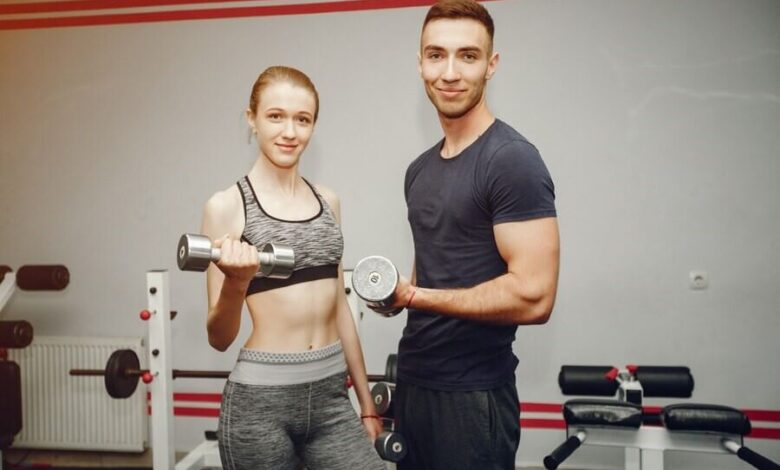How to Set Realistic Fitness Goals with Your Personal Trainer

Setting realistic fitness goals is one of the important steps toward a sustainable and rewarding journey of fitness. Be it weight loss, muscle gain, or generally getting healthier, the personal trainer will always guide you to the right track. Here is how to collaborate with your personal trainer in order to achieve realistic fitness goals which really cater to your needs and lifestyle.
Know Your Starting Point
In order to have a goal, you will need to know where you are coming from. Your personal trainer will perform a few tests on you that will analyze your fitness levels through body composition analysis and strength and endurance tests. You should be honest when asked about your habits and any challenges you face besides any medical conditions that may negatively affect your fitness journey.
Why this matters:
This will mean that your goals will be realistic to you in terms of what you are capable of doing and the baseline has been understood. For instance, if one is just beginning exercising, you cannot run a marathon after two months but running 5K after six months would be possible.
Define Your “Why”
Most importantly, your personal trainer will likely ask why you want to go through this process. If you wish to be more confident, reduce your stress, or improve health metrics, your motivation can help in forming goals that speak to your emotions.
Key Tip:
The connection of fitness goals to personal values or long-term aspirations makes it easier to stick to the goal. Instead of “get fit,” the goal is “increase energy levels to play actively with my kids.”
Use the SMART Framework
When setting goals, one should use the framework of SMART to ensure success.
Specific: Clearly specify what you want to obtain, such as “Lose 10 pounds.”
Measurable: Criteria for monitoring progress (“Lose 1 pound per week”).
Achievable: Ensure the goal is attainable, considering your current lifestyle and resources.
Relevant: Align the goal with your personal fitness aspirations.
Time-bound: Set a deadline, such as “Get this done in 10 weeks.”.
Your personal trainer can refine your goals to fit into this framework so that they are neither too ambitious nor too vague.
Focus on Process Goals Over Outcome Goals
Outcome goals, such as “lose 20 pounds,” are long-term achievements. Though these are important, only focusing on them can be overwhelming. Instead, set process goals, which are actionable steps leading to the desired outcome.
Example Process Goals:
- Exercise for 30 minutes, three times a week.
- Drink eight glasses of water per day.
- Put veggies in every meal
Building habits will form an even stronger foundation for longevity
Be Practical Regarding Timeframes
Fitness transformations do not come overnight, and your coach would give you an estimate of what is possible in the span of certain timeframes. You should not, in any way, be on unrealistic expectations such as shedding 30 pounds within one month. Your coach would help you to be goal-oriented in gradual and continuous phases, which is better suited and healthy.
Why It Matters:
Unrealistic goals will make you frustrated and burn out, while realistic ones keep you motivated and focused.
Focus on Flexibility and Revision of Goals
Life is unpredictable; an injury, work commitment, or family will get in the way. Discuss with your trainer why flexibility and goal adjustment are crucial. If you miss a goal because of some unforeseen reason, your trainer can help adjust the plan so that you remain on track without being defeated by failure.
Celebrate Small Wins
Celebrate milestones as you go, and it applies that some milestones could involve finishing your first unassisted pull-up or simply sticking to a workout schedule for a month. Your trainer can help you determine those victories.
Pro Tip:
Celebrate those wins by reviewing how far you have come and strengthening good habits.
Use Your Trainer’s Expertise
Personal trainers have great knowledge in terms of exercise science, nutrition, and behavior change. Leverage their knowledge to refine your goals, learn proper techniques, and stay accountable. Be open to their feedback and willing to adjust your approach based on their recommendations.
Make It Fun
Enjoying the process is the best way to stick to fitness goals. Share your preferences with your trainer, be it group classes, or learning new activities like boxing and yoga, or getting in shape outdoors.
Commit to Consistency
Ultimately, consistency is the most essential characteristic for achieving fitness goals. Work with your personal trainer in Brooklyn is designing a realistic workout schedule and habits that can simply be integrated into your busy lifestyle. Remember, perfect effort is not necessary because even slow and steady wins at the end.
Final thoughts
Collaboration, self-awareness, and patience are essential requirements for setting realistic fitness goals with a personal trainer. With this, you can start working on your roadmap toward success by considering your starting point, focusing on process goals, applying the SMART framework, and celebrating small wins. For seniors, personalized fitness plans are especially beneficial. Personal training for seniors in Brooklyn ensures tailored approaches that account for unique health needs and goals, fostering a sustainable and enjoyable fitness journey. With your trainer’s guidance and a commitment to consistency, you can achieve your fitness aspirations effectively.






